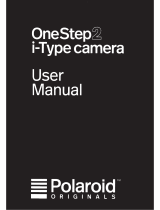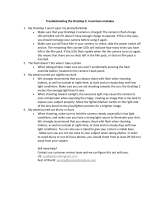
Minimum lens-subject distance
• Fixed-focused models (OneStep, The Button): 4 feet
• Manually-focused Pronto! models: 3 feet
• Pronto! Sonar/Autofocus: 3 feet
Using FlashBars
Note that FlashBars are no longer manu-
factured. For information about third-
party vendors, call Americas Business
Center, 1-800-343-5000, or visit
www.polaroid.com.
Flash must be used for indoor pictures.
Effective FlashBar ranges:
• 4 feet to 8 feet for OneStep models
and The Button
• 3 feet to 12 feet for Pronto! models
Insert a FlashBar into the socket on the top front of the camera
body above the lens or sonar and push in firmly.
When all five bulbs on one side are used, remove the FlashBar and
turn it around for the remaining five bulbs.
IMPORTANT FLASH REMINDERS
• Always shoot within the flash range.
• Place subject close to a colorful background, if possible.
• In group pictures, have everyone about the same distance from
the flash for even lighting.
• Avoid hot spots and reflections from mirrors, windows, artwork,
eyeglasses, etc. reflecting the flash. Shoot at an angle rather than
head-on.
Lighten/Darken control
If subject is too light or too dark in daylight pic-
tures, compensate by turning the Lighten/Darken
control one mark and shoot again in the same
place with the same lighting. White area lightens
picture, dark area darkens.
Cleaning the rollers
The rollers inside the film compartment
should be kept clean. Before loading each
new pack of film, examine the rollers by
rotating each one separately.
Wipe rollers with a moist lint-free cloth—
never scrape them. Check the ends of the
rollers, too, as well as the picture exit slot.
Use only water to clean rollers.
Image manipulation
Image manipulation is a creative technique using Time-Zero SX-70
film. Artists apply pressure to the images after the pictures eject
from the camera. They use a variety of tools, including pen caps,
popsicle sticks, clay modeling tools and dental instruments to
achieve different results.
For more information about image or emulsion transfer and other
creative uses for Time-Zero SX-70 film, call Americas Business
Center, 1-800-343-5000, or visit www.polaroid.com.
Additional information
We have a staff of Polaroid photography experts whose job is to
help you take good pictures. Direct your camera, film and picture
questions to Americas Business Center.
Call toll-free, 1-800-343-5000, 8am to 8 pm EST, Mon - Fri (USA
and Canada only) or visit www.polaroid.com.






